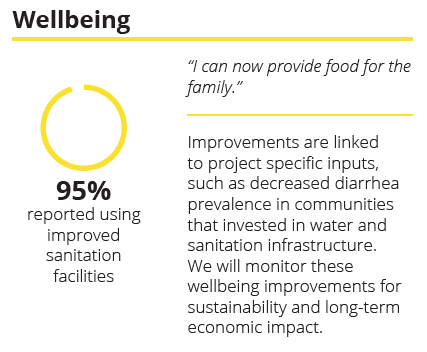Determining Community Impact: Report Brief
Three communities that have been working with OneVillage Partners since 2015, and have completed the Community Action and Nurturing Opportunities for Women programs, were evaluated through the lens of OneVillage Partners’ Theory of Change components: Inclusive Leadership, Gender Equity, Social Cohesion, Resiliency, and Wellbeing. Community members participated in household surveys and Most Significant Change storytelling, where program participants lead the process by telling stories of significant change they experienced due to the programs. Below is a summary of Determining Community Impact: Mixed Methods Evaluation of First Phase Programming. Read the full report for in-depth knowledge of how our programs are fostering equitable, connected, and thriving communities.
Conclusions and Lessons Learned
Despite the lack of baseline or counterfactual data for the household survey, there is still strong evidence of change over time, especially in Most Significant Change stories where respondents describe what their home was like before, what OneVillage Partners did, and what has changed because of it. The Theory of Change appears to be working as hypothesized.
Shifting the data collection timeline until later in communities’ engagement with programs allowed more medium-term outcomes to surface, however there still remains an evidence gap in some hypothesized long-term outcomes. In order to truly understand sustained change and resiliency, data should be collected post-exit.
Read more about our approach and impact.





